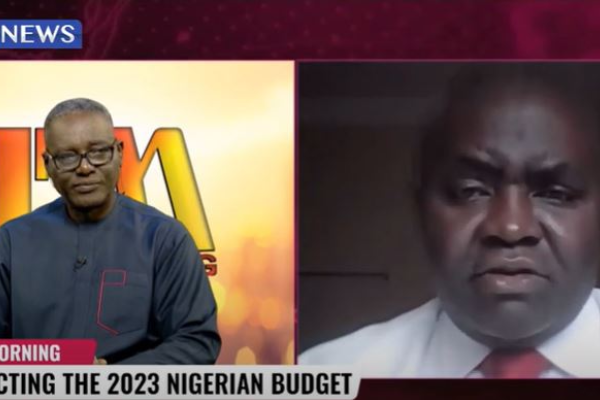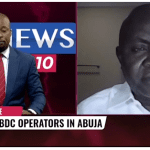President Muhammadu Buhari’s presentation of the 2023 Appropriation Bill last Friday may have set the tone for another unsatisfying yearly ritual that drains public funds while adding nothing to the economy.
This is because, for the umpteenth time, the Appropriation Bill has been filled with false assumptions and unrealistic targets, according to finance experts.
President Buhari presented a N20.52 trillion spending proposal to the National Assembly on Friday, describing the appropriation as a “Budget of Fiscal Consolidation and Transition.”
[wonderplugin_video iframe=”https://youtu.be/0kVLAW70kWE” lightbox=0 lightboxsize=1 lightboxwidth=960 lightboxheight=540 autoopen=0 autoopendelay=0 autoclose=0 lightboxtitle=”” lightboxgroup=”” lightboxshownavigation=0 showimage=”” lightboxoptions=”” videowidth=600 videoheight=400 keepaspectratio=1 autoplay=0 loop=0 videocss=”position:relative;display:block;background-color:#000;overflow:hidden;max-width:100%;margin:0 auto;” playbutton=”https://www.tvcnews.tv/wp-content/plugins/wonderplugin-video-embed/engine/playvideo-64-64-0.png”]
The budget includes a deficit of 10.78 trillion, or 52.5 percent of total expenditure, which the President stated would be funded through new borrowing, privatization proceeds, and “drawdowns on bilateral and multilateral loans secured for specific development projects/programs.”
However, experts dismissed the document as yet another painful reflection of the unrealistic and wild ambition that has defined recent national economic management.
CEO, Centre for Promotion of Private Enterprise,Dr. Muda Yusuf said on TVC ThisMorning with Yori Folarin, that there is nothing to cheer about the budget, particularly in terms of funding capacity.
According to him, the budget, especially the expenditure, is not as large as it appears.
He said “We have a budget proposal of 20.51 trillion dollars and a debt service payment of 6.3 trillion dollars.
“The amount that is actually available for proper spending in terms of capital or recurring expenditure, that is non-debt, is approximately 14 trillion because we have a debt service of 6.3 trillion.
Dr. Yusuf stated that any revenue generated by the country is used to pay off the country’s debt before anything else is considered.
According to our track record of revenue performance over the last few years, the best we’ve had is around 60% of target.
Dr. Muda Yusuf claims that the President’s proposed 2023 budget will be funded almost completely by borrowing.
“With an 8.8 trillion borrowing proposal, new borrowings, you already have a debt profile of nearly 43 trillion. By the time you include this 8.8, the total debt will be close to 50trillion”.
The government is also heavily indebted to the CBN because the CBN has filling a lot of financing gaps for the government that are not covered by the CBN Act. This is also approaching 20 trillion.
He stated that when these figures are added together, we will be talking about nearly 70 trillion dollars in debt.
“What we’re looking at is a massive legacy, a massive financial burden on both the people and the incoming administration.”
President Muhammadu Buhari’s presentation of the 2023 Appropriation Bill last Friday may have set the tone for another unsatisfying yearly ritual that drains public funds while adding nothing to the economy.
This is because, for the umpteenth time, the Appropriation Bill has been filled with false assumptions and unrealistic targets, according to finance experts.
President Buhari presented a N20.52 trillion spending proposal to the National Assembly on Friday, describing the appropriation as a “Budget of Fiscal Consolidation and Transition.”
[wonderplugin_video iframe=”https://youtu.be/0kVLAW70kWE” lightbox=0 lightboxsize=1 lightboxwidth=960 lightboxheight=540 autoopen=0 autoopendelay=0 autoclose=0 lightboxtitle=”” lightboxgroup=”” lightboxshownavigation=0 showimage=”” lightboxoptions=”” videowidth=600 videoheight=400 keepaspectratio=1 autoplay=0 loop=0 videocss=”position:relative;display:block;background-color:#000;overflow:hidden;max-width:100%;margin:0 auto;” playbutton=”https://www.tvcnews.tv/wp-content/plugins/wonderplugin-video-embed/engine/playvideo-64-64-0.png”]
The budget includes a deficit of 10.78 trillion, or 52.5 percent of total expenditure, which the President stated would be funded through new borrowing, privatization proceeds, and “drawdowns on bilateral and multilateral loans secured for specific development projects/programs.”
However, experts dismissed the document as yet another painful reflection of the unrealistic and wild ambition that has defined recent national economic management.
CEO, Centre for Promotion of Private Enterprise,Dr. Muda Yusuf said on TVC ThisMorning with Yori Folarin, that there is nothing to cheer about the budget, particularly in terms of funding capacity.
According to him, the budget, especially the expenditure, is not as large as it appears.
He said “We have a budget proposal of 20.51 trillion dollars and a debt service payment of 6.3 trillion dollars.
“The amount that is actually available for proper spending in terms of capital or recurring expenditure, that is non-debt, is approximately 14 trillion because we have a debt service of 6.3 trillion.
Dr. Yusuf stated that any revenue generated by the country is used to pay off the country’s debt before anything else is considered.
According to our track record of revenue performance over the last few years, the best we’ve had is around 60% of target.
Dr. Muda Yusuf claims that the President’s proposed 2023 budget will be funded almost completely by borrowing.
“With an 8.8 trillion borrowing proposal, new borrowings, you already have a debt profile of nearly 43 trillion. By the time you include this 8.8, the total debt will be close to 50trillion”.
The government is also heavily indebted to the CBN because the CBN has filling a lot of financing gaps for the government that are not covered by the CBN Act. This is also approaching 20 trillion.
He stated that when these figures are added together, we will be talking about nearly 70 trillion dollars in debt.
“What we’re looking at is a massive legacy, a massive financial burden on both the people and the incoming administration.”
President Muhammadu Buhari’s presentation of the 2023 Appropriation Bill last Friday may have set the tone for another unsatisfying yearly ritual that drains public funds while adding nothing to the economy.
This is because, for the umpteenth time, the Appropriation Bill has been filled with false assumptions and unrealistic targets, according to finance experts.
President Buhari presented a N20.52 trillion spending proposal to the National Assembly on Friday, describing the appropriation as a “Budget of Fiscal Consolidation and Transition.”
[wonderplugin_video iframe=”https://youtu.be/0kVLAW70kWE” lightbox=0 lightboxsize=1 lightboxwidth=960 lightboxheight=540 autoopen=0 autoopendelay=0 autoclose=0 lightboxtitle=”” lightboxgroup=”” lightboxshownavigation=0 showimage=”” lightboxoptions=”” videowidth=600 videoheight=400 keepaspectratio=1 autoplay=0 loop=0 videocss=”position:relative;display:block;background-color:#000;overflow:hidden;max-width:100%;margin:0 auto;” playbutton=”https://www.tvcnews.tv/wp-content/plugins/wonderplugin-video-embed/engine/playvideo-64-64-0.png”]
The budget includes a deficit of 10.78 trillion, or 52.5 percent of total expenditure, which the President stated would be funded through new borrowing, privatization proceeds, and “drawdowns on bilateral and multilateral loans secured for specific development projects/programs.”
However, experts dismissed the document as yet another painful reflection of the unrealistic and wild ambition that has defined recent national economic management.
CEO, Centre for Promotion of Private Enterprise,Dr. Muda Yusuf said on TVC ThisMorning with Yori Folarin, that there is nothing to cheer about the budget, particularly in terms of funding capacity.
According to him, the budget, especially the expenditure, is not as large as it appears.
He said “We have a budget proposal of 20.51 trillion dollars and a debt service payment of 6.3 trillion dollars.
“The amount that is actually available for proper spending in terms of capital or recurring expenditure, that is non-debt, is approximately 14 trillion because we have a debt service of 6.3 trillion.
Dr. Yusuf stated that any revenue generated by the country is used to pay off the country’s debt before anything else is considered.
According to our track record of revenue performance over the last few years, the best we’ve had is around 60% of target.
Dr. Muda Yusuf claims that the President’s proposed 2023 budget will be funded almost completely by borrowing.
“With an 8.8 trillion borrowing proposal, new borrowings, you already have a debt profile of nearly 43 trillion. By the time you include this 8.8, the total debt will be close to 50trillion”.
The government is also heavily indebted to the CBN because the CBN has filling a lot of financing gaps for the government that are not covered by the CBN Act. This is also approaching 20 trillion.
He stated that when these figures are added together, we will be talking about nearly 70 trillion dollars in debt.
“What we’re looking at is a massive legacy, a massive financial burden on both the people and the incoming administration.”
President Muhammadu Buhari’s presentation of the 2023 Appropriation Bill last Friday may have set the tone for another unsatisfying yearly ritual that drains public funds while adding nothing to the economy.
This is because, for the umpteenth time, the Appropriation Bill has been filled with false assumptions and unrealistic targets, according to finance experts.
President Buhari presented a N20.52 trillion spending proposal to the National Assembly on Friday, describing the appropriation as a “Budget of Fiscal Consolidation and Transition.”
[wonderplugin_video iframe=”https://youtu.be/0kVLAW70kWE” lightbox=0 lightboxsize=1 lightboxwidth=960 lightboxheight=540 autoopen=0 autoopendelay=0 autoclose=0 lightboxtitle=”” lightboxgroup=”” lightboxshownavigation=0 showimage=”” lightboxoptions=”” videowidth=600 videoheight=400 keepaspectratio=1 autoplay=0 loop=0 videocss=”position:relative;display:block;background-color:#000;overflow:hidden;max-width:100%;margin:0 auto;” playbutton=”https://www.tvcnews.tv/wp-content/plugins/wonderplugin-video-embed/engine/playvideo-64-64-0.png”]
The budget includes a deficit of 10.78 trillion, or 52.5 percent of total expenditure, which the President stated would be funded through new borrowing, privatization proceeds, and “drawdowns on bilateral and multilateral loans secured for specific development projects/programs.”
However, experts dismissed the document as yet another painful reflection of the unrealistic and wild ambition that has defined recent national economic management.
CEO, Centre for Promotion of Private Enterprise,Dr. Muda Yusuf said on TVC ThisMorning with Yori Folarin, that there is nothing to cheer about the budget, particularly in terms of funding capacity.
According to him, the budget, especially the expenditure, is not as large as it appears.
He said “We have a budget proposal of 20.51 trillion dollars and a debt service payment of 6.3 trillion dollars.
“The amount that is actually available for proper spending in terms of capital or recurring expenditure, that is non-debt, is approximately 14 trillion because we have a debt service of 6.3 trillion.
Dr. Yusuf stated that any revenue generated by the country is used to pay off the country’s debt before anything else is considered.
According to our track record of revenue performance over the last few years, the best we’ve had is around 60% of target.
Dr. Muda Yusuf claims that the President’s proposed 2023 budget will be funded almost completely by borrowing.
“With an 8.8 trillion borrowing proposal, new borrowings, you already have a debt profile of nearly 43 trillion. By the time you include this 8.8, the total debt will be close to 50trillion”.
The government is also heavily indebted to the CBN because the CBN has filling a lot of financing gaps for the government that are not covered by the CBN Act. This is also approaching 20 trillion.
He stated that when these figures are added together, we will be talking about nearly 70 trillion dollars in debt.
“What we’re looking at is a massive legacy, a massive financial burden on both the people and the incoming administration.”
President Muhammadu Buhari’s presentation of the 2023 Appropriation Bill last Friday may have set the tone for another unsatisfying yearly ritual that drains public funds while adding nothing to the economy.
This is because, for the umpteenth time, the Appropriation Bill has been filled with false assumptions and unrealistic targets, according to finance experts.
President Buhari presented a N20.52 trillion spending proposal to the National Assembly on Friday, describing the appropriation as a “Budget of Fiscal Consolidation and Transition.”
[wonderplugin_video iframe=”https://youtu.be/0kVLAW70kWE” lightbox=0 lightboxsize=1 lightboxwidth=960 lightboxheight=540 autoopen=0 autoopendelay=0 autoclose=0 lightboxtitle=”” lightboxgroup=”” lightboxshownavigation=0 showimage=”” lightboxoptions=”” videowidth=600 videoheight=400 keepaspectratio=1 autoplay=0 loop=0 videocss=”position:relative;display:block;background-color:#000;overflow:hidden;max-width:100%;margin:0 auto;” playbutton=”https://www.tvcnews.tv/wp-content/plugins/wonderplugin-video-embed/engine/playvideo-64-64-0.png”]
The budget includes a deficit of 10.78 trillion, or 52.5 percent of total expenditure, which the President stated would be funded through new borrowing, privatization proceeds, and “drawdowns on bilateral and multilateral loans secured for specific development projects/programs.”
However, experts dismissed the document as yet another painful reflection of the unrealistic and wild ambition that has defined recent national economic management.
CEO, Centre for Promotion of Private Enterprise,Dr. Muda Yusuf said on TVC ThisMorning with Yori Folarin, that there is nothing to cheer about the budget, particularly in terms of funding capacity.
According to him, the budget, especially the expenditure, is not as large as it appears.
He said “We have a budget proposal of 20.51 trillion dollars and a debt service payment of 6.3 trillion dollars.
“The amount that is actually available for proper spending in terms of capital or recurring expenditure, that is non-debt, is approximately 14 trillion because we have a debt service of 6.3 trillion.
Dr. Yusuf stated that any revenue generated by the country is used to pay off the country’s debt before anything else is considered.
According to our track record of revenue performance over the last few years, the best we’ve had is around 60% of target.
Dr. Muda Yusuf claims that the President’s proposed 2023 budget will be funded almost completely by borrowing.
“With an 8.8 trillion borrowing proposal, new borrowings, you already have a debt profile of nearly 43 trillion. By the time you include this 8.8, the total debt will be close to 50trillion”.
The government is also heavily indebted to the CBN because the CBN has filling a lot of financing gaps for the government that are not covered by the CBN Act. This is also approaching 20 trillion.
He stated that when these figures are added together, we will be talking about nearly 70 trillion dollars in debt.
“What we’re looking at is a massive legacy, a massive financial burden on both the people and the incoming administration.”
President Muhammadu Buhari’s presentation of the 2023 Appropriation Bill last Friday may have set the tone for another unsatisfying yearly ritual that drains public funds while adding nothing to the economy.
This is because, for the umpteenth time, the Appropriation Bill has been filled with false assumptions and unrealistic targets, according to finance experts.
President Buhari presented a N20.52 trillion spending proposal to the National Assembly on Friday, describing the appropriation as a “Budget of Fiscal Consolidation and Transition.”
[wonderplugin_video iframe=”https://youtu.be/0kVLAW70kWE” lightbox=0 lightboxsize=1 lightboxwidth=960 lightboxheight=540 autoopen=0 autoopendelay=0 autoclose=0 lightboxtitle=”” lightboxgroup=”” lightboxshownavigation=0 showimage=”” lightboxoptions=”” videowidth=600 videoheight=400 keepaspectratio=1 autoplay=0 loop=0 videocss=”position:relative;display:block;background-color:#000;overflow:hidden;max-width:100%;margin:0 auto;” playbutton=”https://www.tvcnews.tv/wp-content/plugins/wonderplugin-video-embed/engine/playvideo-64-64-0.png”]
The budget includes a deficit of 10.78 trillion, or 52.5 percent of total expenditure, which the President stated would be funded through new borrowing, privatization proceeds, and “drawdowns on bilateral and multilateral loans secured for specific development projects/programs.”
However, experts dismissed the document as yet another painful reflection of the unrealistic and wild ambition that has defined recent national economic management.
CEO, Centre for Promotion of Private Enterprise,Dr. Muda Yusuf said on TVC ThisMorning with Yori Folarin, that there is nothing to cheer about the budget, particularly in terms of funding capacity.
According to him, the budget, especially the expenditure, is not as large as it appears.
He said “We have a budget proposal of 20.51 trillion dollars and a debt service payment of 6.3 trillion dollars.
“The amount that is actually available for proper spending in terms of capital or recurring expenditure, that is non-debt, is approximately 14 trillion because we have a debt service of 6.3 trillion.
Dr. Yusuf stated that any revenue generated by the country is used to pay off the country’s debt before anything else is considered.
According to our track record of revenue performance over the last few years, the best we’ve had is around 60% of target.
Dr. Muda Yusuf claims that the President’s proposed 2023 budget will be funded almost completely by borrowing.
“With an 8.8 trillion borrowing proposal, new borrowings, you already have a debt profile of nearly 43 trillion. By the time you include this 8.8, the total debt will be close to 50trillion”.
The government is also heavily indebted to the CBN because the CBN has filling a lot of financing gaps for the government that are not covered by the CBN Act. This is also approaching 20 trillion.
He stated that when these figures are added together, we will be talking about nearly 70 trillion dollars in debt.
“What we’re looking at is a massive legacy, a massive financial burden on both the people and the incoming administration.”
President Muhammadu Buhari’s presentation of the 2023 Appropriation Bill last Friday may have set the tone for another unsatisfying yearly ritual that drains public funds while adding nothing to the economy.
This is because, for the umpteenth time, the Appropriation Bill has been filled with false assumptions and unrealistic targets, according to finance experts.
President Buhari presented a N20.52 trillion spending proposal to the National Assembly on Friday, describing the appropriation as a “Budget of Fiscal Consolidation and Transition.”
[wonderplugin_video iframe=”https://youtu.be/0kVLAW70kWE” lightbox=0 lightboxsize=1 lightboxwidth=960 lightboxheight=540 autoopen=0 autoopendelay=0 autoclose=0 lightboxtitle=”” lightboxgroup=”” lightboxshownavigation=0 showimage=”” lightboxoptions=”” videowidth=600 videoheight=400 keepaspectratio=1 autoplay=0 loop=0 videocss=”position:relative;display:block;background-color:#000;overflow:hidden;max-width:100%;margin:0 auto;” playbutton=”https://www.tvcnews.tv/wp-content/plugins/wonderplugin-video-embed/engine/playvideo-64-64-0.png”]
The budget includes a deficit of 10.78 trillion, or 52.5 percent of total expenditure, which the President stated would be funded through new borrowing, privatization proceeds, and “drawdowns on bilateral and multilateral loans secured for specific development projects/programs.”
However, experts dismissed the document as yet another painful reflection of the unrealistic and wild ambition that has defined recent national economic management.
CEO, Centre for Promotion of Private Enterprise,Dr. Muda Yusuf said on TVC ThisMorning with Yori Folarin, that there is nothing to cheer about the budget, particularly in terms of funding capacity.
According to him, the budget, especially the expenditure, is not as large as it appears.
He said “We have a budget proposal of 20.51 trillion dollars and a debt service payment of 6.3 trillion dollars.
“The amount that is actually available for proper spending in terms of capital or recurring expenditure, that is non-debt, is approximately 14 trillion because we have a debt service of 6.3 trillion.
Dr. Yusuf stated that any revenue generated by the country is used to pay off the country’s debt before anything else is considered.
According to our track record of revenue performance over the last few years, the best we’ve had is around 60% of target.
Dr. Muda Yusuf claims that the President’s proposed 2023 budget will be funded almost completely by borrowing.
“With an 8.8 trillion borrowing proposal, new borrowings, you already have a debt profile of nearly 43 trillion. By the time you include this 8.8, the total debt will be close to 50trillion”.
The government is also heavily indebted to the CBN because the CBN has filling a lot of financing gaps for the government that are not covered by the CBN Act. This is also approaching 20 trillion.
He stated that when these figures are added together, we will be talking about nearly 70 trillion dollars in debt.
“What we’re looking at is a massive legacy, a massive financial burden on both the people and the incoming administration.”
President Muhammadu Buhari’s presentation of the 2023 Appropriation Bill last Friday may have set the tone for another unsatisfying yearly ritual that drains public funds while adding nothing to the economy.
This is because, for the umpteenth time, the Appropriation Bill has been filled with false assumptions and unrealistic targets, according to finance experts.
President Buhari presented a N20.52 trillion spending proposal to the National Assembly on Friday, describing the appropriation as a “Budget of Fiscal Consolidation and Transition.”
[wonderplugin_video iframe=”https://youtu.be/0kVLAW70kWE” lightbox=0 lightboxsize=1 lightboxwidth=960 lightboxheight=540 autoopen=0 autoopendelay=0 autoclose=0 lightboxtitle=”” lightboxgroup=”” lightboxshownavigation=0 showimage=”” lightboxoptions=”” videowidth=600 videoheight=400 keepaspectratio=1 autoplay=0 loop=0 videocss=”position:relative;display:block;background-color:#000;overflow:hidden;max-width:100%;margin:0 auto;” playbutton=”https://www.tvcnews.tv/wp-content/plugins/wonderplugin-video-embed/engine/playvideo-64-64-0.png”]
The budget includes a deficit of 10.78 trillion, or 52.5 percent of total expenditure, which the President stated would be funded through new borrowing, privatization proceeds, and “drawdowns on bilateral and multilateral loans secured for specific development projects/programs.”
However, experts dismissed the document as yet another painful reflection of the unrealistic and wild ambition that has defined recent national economic management.
CEO, Centre for Promotion of Private Enterprise,Dr. Muda Yusuf said on TVC ThisMorning with Yori Folarin, that there is nothing to cheer about the budget, particularly in terms of funding capacity.
According to him, the budget, especially the expenditure, is not as large as it appears.
He said “We have a budget proposal of 20.51 trillion dollars and a debt service payment of 6.3 trillion dollars.
“The amount that is actually available for proper spending in terms of capital or recurring expenditure, that is non-debt, is approximately 14 trillion because we have a debt service of 6.3 trillion.
Dr. Yusuf stated that any revenue generated by the country is used to pay off the country’s debt before anything else is considered.
According to our track record of revenue performance over the last few years, the best we’ve had is around 60% of target.
Dr. Muda Yusuf claims that the President’s proposed 2023 budget will be funded almost completely by borrowing.
“With an 8.8 trillion borrowing proposal, new borrowings, you already have a debt profile of nearly 43 trillion. By the time you include this 8.8, the total debt will be close to 50trillion”.
The government is also heavily indebted to the CBN because the CBN has filling a lot of financing gaps for the government that are not covered by the CBN Act. This is also approaching 20 trillion.
He stated that when these figures are added together, we will be talking about nearly 70 trillion dollars in debt.
“What we’re looking at is a massive legacy, a massive financial burden on both the people and the incoming administration.”














